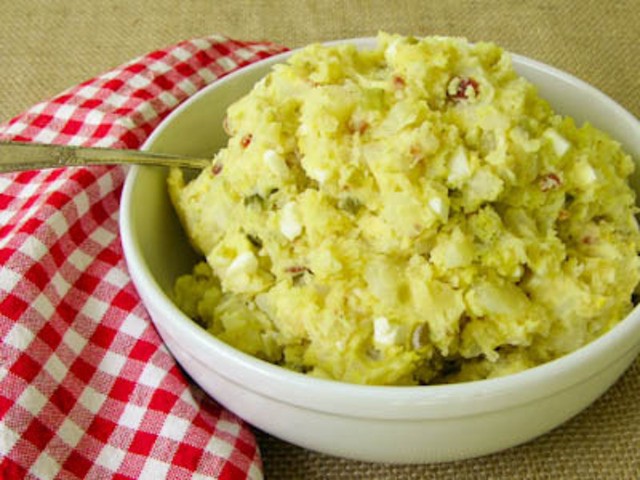The Potato Salad Kickstarter Is the Science Fiction Villain We Deserve

As of writing, a Kickstarter campaign for “just making potato salad” has raised $37,115. Every few seconds that number climbs higher, and each uptick is greeted with cheers. It’s a self-perpetuating humor machine, and it is horribly efficient. There is no joke, at least not anymore; whatever joke there was has become an adaptive, joke-like arrangement of circumstances. It is a perfect device, compatible with all known theories of humor and therefore with none of them.
— The Superiority Theory, which suggests that all humor derives from a feeling of “sudden glory,” explains potato salad: Its participants have money so disposable that they can spend it on nothing. But the Inferiority Theory of humor, which holds that much humor derives from modesty, works too: It is both an assertion of cruel dominion over the world and an act of self-deprecation to donate ten dollars to a Kickstarter to make potato salad.
— The Relief Theory of humor, which claims that laughter comes from the “release of excessive energy,” explains the potato salad as well. The campaign is a release of seriousness, a release of techno-utopianism, a release of capital. It is a multi-purpose blowoff valve, BUT WHERE DOES ALL THE ENERGY GO NEXT?
— The Incongruity Theory suggests that humor stems from absurdity or inconsistency, or, in a more specific formulation, the “mechanical encrusted upon the living.” Kickstarter is, in its own formulation, “a new way to fund creative projects.” Potato salad is not a typical “project,” nor is it particularly “creative.” But the campaign itself — the use of Kickstarter — was initially creative, before the parody was so effortlessly assimilated. An inversion, an incongruity, another explanation. And yet still: despair.
Potato salad satisfies these and all other doomed attempts to systematize humor, which might be the only way to understand it: It is humor-shaped and perfectly optimized. If it was ever whimsical it isn’t anymore — there is too much money, too much potential, tied up with this salad. But this foundation of whimsy has created circumstances in which more capital is equated with more humor, which is too horrible an idea to even joke about: It is a transcendence that is out of our control, a villain, an invader, an awakening of The Old Ones, a Dire Event, or at least a Portent. What’s funnier than $37,115 for potato salad? $47,115 for potato salad, ha ha. What’s funnier than $47,115? $100,000. With every new dollar it feels more urgent to a viewer that he attach his name and his dollars to the thing, which is now obscured entirely by noise — a fee for ensuring that you’re in on the joke.
It’s an investment compulsion, and the investment is a scam. (It’s fun to imagine all business opportunities as jokes: They are temporary and dependent entirely on context; they are taken advantage of at the expense of someone or something that is often neither aware nor present; they are — necessarily? — cruel; they inspire the same embarrassing urge for inclusion, and the same shameful regret upon misapprehension or exclusion. Jokes! Look around you: Isn’t it nice, that it’s all just jokes?). If the campaign keeps going, some people may start to claim that, at some specific level of investment, the joke is no longer funny. It will be too much — the money could be better used on another campaign, or in another context entirely. This will be true but it will have always been true. None of these people will be able to explain to you what exactly changed.
This is when it will begin to feel obvious, after Kickstarter takes its five percent, after Amazon banks its cut, when all at once the internet feels an opposite, equally irresistible urge to pretend that none of this ever happened, that we realize what the joke really was, and at whose expense it was told.
